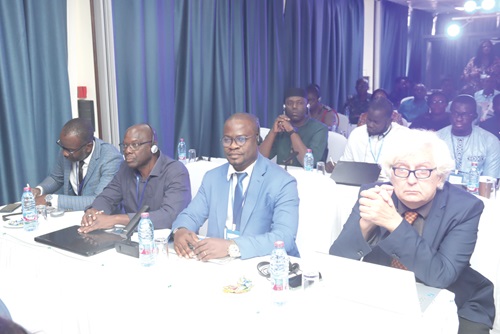
Stakeholders celebrate success of Volta Basin flood, drought management project
A five-year Volta Basin Flood and Drought Management (VFDM) project has ended with beneficiary countries calling for an expansion to strengthen early warning systems in Ghana and across the sub-region.
The VFDM project, which began in 2019, has successfully developed the systems for reducing vulnerabilities and increasing community resilience in the Volta Basin riparian countries comprised of Benin, Burkina Faso, Côte d'Ivoire, Ghana, Mali, and Togo.
The project was implemented by the Volta Basin Authority in collaboration with the Global Water Partnership and the World Meteorological Organisation aimed at enhancing flood and drought management and early warning systems in the Volta Basin.
The VFDM implementers expressed satisfaction that the project had improved and strengthened timely forecasting and warning systems at national, regional and local levels, in order to effectively reach affected populations.
The project has also promoted climate resilience in the region and also provided training on impact-based drought monitoring and experience sharing in the region.
More to be done
Speaking at the closing ceremony of the VFDM project's Technical Advisory Committee workshop to mark the completion of the project, the Minister of Sanitation and Water Resources, Lydia Seyram Alhassan, emphasised the importance of scaling up the project's impact to build climate-resilient communities in all the Volta Basin member countries.

In a speech read on her behalf by the Deputy Minister of Sanitation and Water Resources, Amidu Issahaku Chinnia, the minister said although the project had achieved a number of results “much work needs to be done”.
The Minister of Communications and Digitalisation, Ursula Owusu-Ekuful, in a speech delivered on her behalf by the Deputy Minister, Charles Acheampong, said an expansion of the project would help build on its outcomes and integrate its lessons into the daily operations of the implementing institutions.
The minister acknowledged the project's significant contributions to enhancing early warning systems in Ghana and the region, which aligned with Ghana's objectives to attain Sustainable Development Goal 13 (SDG 13) on Climate Action and the National Framework for Climate Services (NFCS).
She expressed gratitude to the VFDM partners and urged them to consider a second phase of the project to further strengthen institutional capacity and impact.
The minister also commended the Adaptation Fund for its financial contribution to the project and encouraged continued support to achieve the resource mobilisation goals of the Integrated African Strategy on Meteorology (2021-2030).
The workshop brought together experts from across the region to share experiences and best practices in flood and drought management, early warning systems and climate change adaptation.
Combating Climate Change
The Deputy Minister of Works and Housing, Dr Prince Hamid Armah, highlighted the importance of technological advancements in predicting and preparing for extreme weather events.
He said the Ghana government had demonstrated commitment to reinforcing early warning systems through supporting GMet's recruitment and procurement of equipment and enacting the Ghana Hydrological Authority Act, 2022 to protect lives and livelihoods.
The deputy minister urged continued collaboration to enhance global resilience, emphasising that early warning systems were lifelines for communities facing climate change challenges.
The Board Chairman of GMet, George Isaac Amoo, praised the project's achievements and urged implementing institutions to integrate its lessons into their daily operations. The Deputy Executive Director of the Volta Basin Authority, Dr Dibi MILLOGO, stated that, "it is necessary to involve national stakeholders to ensure greater ownership of the results of projects and programmes, to have adequate decision-making tools and to have modern equipment for more accurate forecasts".
Mr Milogo said the 32 million residents of the riparian countries of the Volta basin would have been affected by extreme weather conditions such as floods and drought and “we will lose 430,000 hectares of crops, thousands of grazing lands and lives if nothing was done.”
He said the losses were estimated at $210 billion “and that is why we need to have a second phase to avert the losses so that the Volta Basin will become a better place
The Project Director and Chief Scientist of the World Meteorological Organisation, Giacomo Teruggi, noted that "the Volta Flood and Drought Management project is a successful application of the integration of the technical, institutional, social and environmental aspects of flood and drought management.”
The Executive Secretary of the Global Water Partnership West Africa, Armand Houange, commended all the partners and institutions in the Volta Basin member countries for working together for the successful implementation of the project.
“A lot of lessons have been learnt and we need to remain committed to championing climate change resilience in the region,” he said. He said some of the results achieved so far were fragile and there was the need to continue working beyond the completion of the project to build a more sustainable future.
